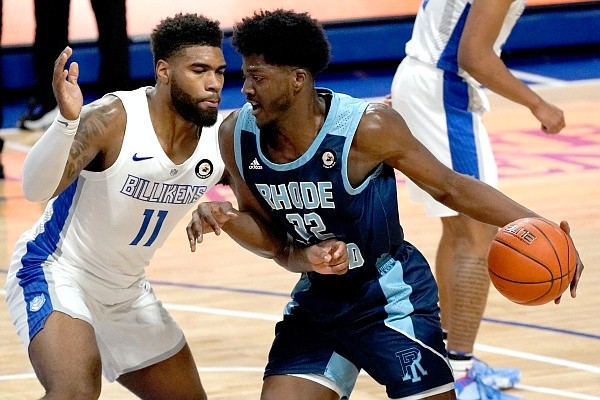Makhi and Makhel Mitchell stick together.
After signing with and playing at Maryland out of high school for the 2019-20 season, the twins picked up and transferred to Rhode Island, where they grew their games over the last two years. On Wednesday, the duo announced Arkansas as their next landing spot.
The news comes on the heels of three Razorbacks declaring for the 2022 NBA Draft and forward Connor Vanover's intent to transfer. The Mitchell brothers are the second and third transfer portal additions of the spring for Arkansas.
Former Missouri forward Trevon Brazile signed with the Razorbacks last week.
Both 27-game starters last season, Makhel (6-10, 245) and Makhi (6-9, 230) will add quality size and offensive versatility, provide solid front-line depth and more shot blocking to Arkansas’ roster in 2022-23. In their final season at Rhode Island, they combined to block 3.8 shots per game and 5.9 per 40 minutes.
Makhel averaged 2.4 blocks and finished fourth in the Atlantic 10 Conference in that category in both seasons with the Rams. Makhi’s 43 total rejections last season placed him ninth in the league.
Makhel looks to be an ideal fit for an Eric Musselman-coached team.
According to KenPom data, he finished 2021-22 with the No. 19 block percentage in the country (11.1%) and drew 4.8 fouls per 40 minutes played. He also shot better than 50% on two-point field goal attempts and grabbed 18.5% of available defensive rebounds when on the floor.
Makhel blocked at least two shots 21 times a season ago and four or more in seven games. In a home game against Boston College on Nov. 17, he finished with 8 points, 7 rebounds and 8 blocks.
“I love defense,” he said in an interview with Rhode Island insider Chris Disano in Oct. 2020. “Defense turns into offense, and that’s why I like it so much, because once you get a stop, we’re off to the races and going to get a bucket at the other end.
“I’ve always liked defense, but once you get older you understand that defense is so important. Rotating and all of that, I’m good at all of that. Talking and communicating, just being a leader, I like all of that stuff.”
He also had a bit of success against three teams that played in the NCAA Tournament in 2022.
Matched up with Providence on Dec. 4, he recorded 9 points, 3 rebounds and 2 blocks. In two games vs. Richmond, he averaged 15 points, 6 rebounds and 1.5 blocks, and added 9.5 points, 6.5 rebounds and 2 blocks in two games against Davidson.
Makhel can do more than rebound (5.6 per game) and protect the rim, though. According to Hoop Math statistics, half of his 264 field goal attempts last season came at the rim. He converted at a 68.2% clip.
His 90 scores at the rim led the Rams.
“My game is back-to-the-basket, screen-and-roll, an aggressive rebounder who loves to play defense and is willing to win,” he said. “I will do whatever it takes to win. I’m dedicated to hard work.”
Makhi, another fit stylistically, finished second on the team with 87 rim scores on 118 shots.
Makhi also recorded a defensive rebound rate of 26%, according to KenPom, a figure that placed him 35th nationally. His block rate of 7% was good for 76th in the country.
In 14 games last season he tallied six or more defensive rebounds, including a season-high 14 against Bryant. He also had 10 in losses to Massachusetts and George Washington.
In terms of shot blocking, Makhi recorded three, four and six rejections against Tulsa, UMass and Saint Louis, respectively. In A-10 play, he had the No. 5 block rate and No. 10 steal percentage.
“I think I’m just an all-around basketball player,” he told Disano. “I can do versatile things. I’m a good passer. On defense, protecting the rim, hedging and whatever the teams needs me to do, I’m pretty sure I can do it.
“(Blocking shots) is all about timing and strategy. You’re not going to be able to block everything. I’ve got long arms, too, so that gives me an advantage, too.”
Neither player appears to be a great perimeter threat, though. Makhi made 7 of 23 three-point attempts last season while Makhel was 0 of 7. And they can be inefficient two-point jump shooters.
Per Hoop Math, Makhel made 43 of 127 (33.9%) such shots and Makhi was 20 of 80. But what they lack in that regard, they make up for it at the rim and in transition.
Makhel and Makhi, according to Hoop Lens, were first and third at Rhode Island last season in PAM — points above median, a calculation of how many additional points a player scores when compared with what an average player would have scored on those attempts — at the rim in transition. Their figures were 15.0 and 11.1, respectively.
At the rim in non-transition situations, their PAMs were 39.8 and 35.9. The next closest teammate’s total in that category was 18.6.

